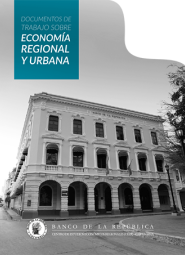Wage Indexation, Inflation Inertia, and the Cost of Disinflation
La serie Borradores de Economía es una publicación de la Subgerencia de Estudios Económicos del Banco de la República. Los trabajos son de carácter provisional, las opiniones y posibles errores son responsabilidad exclusiva del autor y sus contenidos no comprometen al Banco de la República ni a su Junta Directiva.
A Statement of the Colombian Constitutional Court has mandated wage indexation on the basis of past inflation. A simple model with a wage price system, a real block, and an inflation targeting interest rule is calibrated to resemble price setting in the Colombian economy and to analyze the differing slope of the output inflation trade off for different specifications of wage indexation. The disinflation experiments show that backward looking indexation increases inflation inertia, decreases the effect of monetary policy, and increases the cost of disinflation. Shorter wage contracts and more frequent wage negotiations do not appear to have important effects on the cost of disinflation. Higher central bank credibility and the use of forward looking inflation expectations in wage negotiations decrease the cost of disinflation and may eventually lead to a boom.





















































